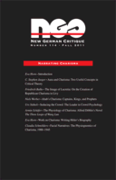New release: New German Critique: Narrating Charisma. Edited by Eva Horn
14. November 2011
Volume 38, Number 3 (2011)
with contributions by (amongst others):
Eva Horn: Introduction. In: New German Critique (2011) 38(3 114): 1-16.
[…] Outlining some of the inherent tensions in Weber's theory of charisma, this article points to the essentially aesthetic aspects of charisma. As a form of leadership, charisma not only fundamentally depends on the imaginations and affects that the charismatic leader can raise in the hearts and minds of his followers; it also depends on the literary or historical narratives that create a basis for that leader's emergence and the crowd's appreciation of him. Thus charisma must be analyzed as an aesthetic phenomenon, as a theatrical role to be performed, and as a literary narrative. The article outlines some of the conceptual tools for this kind of analysis that are offered by the contributions to this special issue of the journal.
Eva Horn is professor of Modern German Literature in the Department of German at the University of Wien. In 2008 she has been Fellow of the Institute for Advanced Studies Konstanz. She worked on “Leaders and Founders: On the Narrative Construction of the Rise and Creation of Community”(with Armin Schäfer).
Niels Werber: Ahab's Charisma: Captains, Kings, and Prophets. In: New German Critique (2011) 38(3 114): 51-62.
[…] Ahab is described as a charismatic type and, vice versa, when the “Ahab-type” is used to produce a theory of charisma, Melville and Weber are drawing on the same source, King Ahab of the Old Testament. Based on these biblical traces in Melville and Weber, this article proposes a new reading both of Moby-Dick and of Weber's theory of charismatic leadership.
Niels Werber is professor for Modern German Literature at the University of Siegen. He has been a Fellow of the Institute for Advanced Studies Konstanz (2011).
Urs Stäheli: Seducing the Crowd: The Leader in Crowd Psychology. In: New German Critique (2011) 38(3 114): 63-77.
This essay traces the figure of the leader in different approaches of crowd psychology (Gustave Le Bon and Gabriel Tarde) and psychoanalysis (Sigmund Freud). It argues that the central role of the leader to the crowd, as Freud's group psychology emphasizes, is not simply given; rather, the leader has to be made a constitutive feature of crowds. […]
Urs Stäheli is professor for sociology at University of Basel, Switzerland. He has been a Fellow of the Institute for Advanced Studies Konstanz (2009).
Armin Schäfer: The Physiology of Charisma: Alfred Döblin's Novel The Three Leaps of Wang Lun. In: New German Critique (2011) 38(3 114): 79-93.
In twentieth-century German literature, Alfred Döblin's novel The Three Leaps of Wang Lun is an outstanding example not only of the invention of a charismatic leader but also of an attempt to analyze those aspects of charisma that Max Weber did not want to touch on. Döblin saw charisma as a process of social interaction (as Weber later described it), but he also considered the affective and physiological micro-processes that enable social bonds and the formation of social groups. […]
Armin Schäfer is professor for Modern German Literature and History of Media Cultures at the FernUniversität Hagen. In 2008 he has been Fellow of the Institute for Advanced Studies Konstanz. Together with Eva Horn he worked on “Leaders and Founders: On the Narrative Construction of the Rise and Creation of Community”.
Eva Horn: Work on Charisma: Writing Hitler's Biography. In: New German Critique (2011) 38(3 114): 95-114.
Recent biographies of Adolf Hitler's life, especially those by Joachim C. Fest, Ian Kershaw, and Ludolf Herbst, have referred extensively to Max Weber's concept of charisma. The article raises the question of what it means to narrate the charisma of a historical figure such as Adolf Hitler. […]
